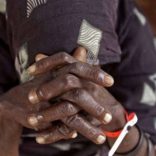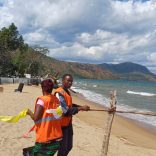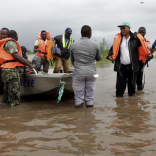Mozambique: 113 elderly people murdered in Inhambane province in first five months of 2025 - police
Mozambique: Deaths by extremist groups increase by 36% in 2024 – Study

FILE - For illustration purposes only. [File photo: Lusa]
At least 349 people were killed in attacks by Islamic extremist groups in northern Mozambique in 2024, an increase of 36% over the previous year, according to a study released by the Africa Centre for Strategic Studies (ACSS) on Thursday.
According to the US Department of Defence’s academic institution, which studies issues related to security in Africa, this “recovery in levels of violence” in Mozambique “reflects the strategy” of the ASWJ group – an affiliate of the Islamic State and operating in Cabo Delgado province – of “extending the conflict, moving inland and into more rural areas”.
“This is causing an overextension of the Mozambican and Rwandan forces, which have been operating without SADC [Southern African Community] forces since mid-2024. The underlying grievances in the Cabo Delgado region remain unresolved, fuelling the recruitment of Islamist militants, especially among young people,” the study warned.
The ACSS said that there was “a marked increase in violence against civilians” in the northern region of Mozambique last year.
“The 122 incidents against civilians accounted for 52% of the total of 236 violent events in 2024,” says the institution in the study, which addresses the terrorist threat that mainly affects the province of Cabo Delgado, northern Mozambique.
It also recognises that the activity of these Islamist groups operating in Mozambique “has always been characterised by its high rate of violence against civilians” and that the 31% of total deaths in 2024 resulting from violence against civilians “is higher than any other Islamist militant group in Africa”.
The ACSS also points out that around 578,000 people who were displaced by the violence of these armed groups “have still not returned to their homes”.
Since October 2017, the gas-rich province of Cabo Delgado has been facing an armed rebellion with attacks claimed by movements associated with the extremist group Islamic State.
On 25 February, Mozambique’s government confirmed some “sporadic attacks” by rebel groups in Cabo Delgado province. The Defence and Security Forces (FDS) remain on the ground to ensure the population’s safety.
“Sporadic attacks are occurring, but the indication we have is that the Defence and Security Forces [FDS] are doing their job properly and, for sure, what happens is that [the alleged terrorists] split into groups, create other mechanisms to scare and terrorise the populations,” said the cabinet spokesman, Inocêncio Impissa, responding to a question from journalists about the current situation in the northern province of Cabo Delgado.
The ACSS study also estimates that there will be at least 18,900 deaths “linked to Islamist militant violence in Africa” by 2024.
“A sharp decline in deaths involving Al Shabaab in Somalia brought the continental total below the record levels of 2023 (23,000 deaths). However, the average annual total number of deaths over the last three years was still more than a third higher than the 2019-2021 period,” the organisation points out.
The Sahel, it also pointed out, “continued to be the continent’s most lethal theatre of operations for the fourth consecutive year”, with 55% of the total fatalities, out of an estimated “10,400 deaths linked to Islamist militant violence”, and the region is also “responsible for the highest prevalence of violence against civilians”.
“The region is responsible for 67% (1,840) of these civilian deaths on the continent. The Lake Chad Basin region came in second, comprising 24% (670) of these deaths, it said.
Just three conflict zones accounted for 98% of the reported deaths linked to violence by Islamist militants on the African continent, namely the Sahel (55%), Somalia (24%) and the Lake Chad Basin (19%).













Leave a Reply
Be the First to Comment!
You must be logged in to post a comment.
You must be logged in to post a comment.